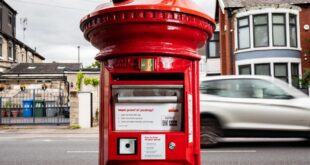The nationalisation of water, energy grids and the Royal Mail would save UK households £7.8 billion a year and pay for itself within seven years, according to new academic research.
A report by Greenwich University’s Public Service International Research Unit put the total cost of compensation to private sector owners at just £49.7 billion – around a quarter of the widely-quoted £196 billion price tag calculated by the CBI last month, which also covered rail.
Labour’s manifesto for the 12 December general election is expected to include commitments to take the rail network, National Grid, water and mail delivery back into public hands.
Download the new Indpendent Premium app
Sharing the full story, not just the headlines
PSIRU director David Hall said his estimates were based on compensating shareholders for the amount they have invested in utilities being taken into public hands, rather than paying out a “market value” price as the CBI suggested.
Savings are calculated by comparing the current cost of dividends and interest paid by private companies to the cost of refinancing with debt raised by issuing government bonds.
1/36
Liberal Democrats leader Jo Swinson in the boxing ring at Total Boxer, a specialised boxing gym which offers training to young people as a means of keeping them away from violence, in Crouch End, London
PA
2/36
Britain’s Prime Minister Boris Johnson reacts as he participates in a school art lesson, making a clay figure at George Spencer Academy, west of Nottingham
AFP via Getty
3/36
Labour Party leader Jeremy Corbyn during a visit to the Heart of Scotstoun Community Centre in Glasgow
PA
4/36
Scotland’s First Minister and SNP leader Nicola Sturgeon visits the Cafe Gelato in Rutherglen, Glasgow
EPA
5/36
The Green Party launch in Bristol
PA
6/36
Farage enjoys some chips at the start of a nationwide tour for the 2019 general election, in Whitehaven
AFP/Getty
7/36
Labour leader Jeremy Corbyn unveils the Labour battle bus in Liverpool
PA
8/36
Boris Johnson reacts as he talks with workers whilst weighing packaged tea bags at the Tetley Tea Factory in Stockton-on-Tees
AFP/Getty
9/36
Brexit Party leader Nigel Farage on the campaign trail in Whitehaven, where he was confronted by Karl Connor
PA
10/36
Lib Dem leader Jo Swinson speaks to volunteer Rosie Squires in the Stainforth 4 All charity shop during a visit to Stainforth in South Yorkshire to meet people affected by flooding
PA
11/36
Nicola Sturgeon poses with candidates during the SNP general election campaign launch in Edinburgh
Reuters
12/36
Labour Party leader Jeremy Corbyn with Laura McAlpine, the party’s candidate for Harlow
PA
13/36
Anti-Boris Johnson protesters demonstrate outside the hall where the Conservative Party were launching their campaign in Birmingham
EPA
14/36
Green Party Co-Leader Sian Berry (left), Deputy Leader and Parliamentary Candidate for Newport West Amelia Womack (right), and Bristol West Candidate Carla Denyer (centre) at the launch of the party’s general election manifesto in Bristol
PA
15/36
The PM tastes whisky during a visit to Diageo’s Roseisle Distillery near Elgin, Scotland
Reuters
16/36
Nigel Farage poses with boxer Dereck Chisora during a visit to a boxing gym in Ilford
Reuters
17/36
Jo Swinson visits a science class at Hinchley Wood School near Esher
Reuters
18/36
First Minister Nicola Sturgeon holds a guitar as she visits Dalkeith Community Hub
Getty
19/36
A man heckles as Jeremy Corbyn gives a speech at the Senior Citizens Hall in Macclesfield
Getty
20/36
Britain’s opposition Labour Party leader Jeremy Corbyn visits residents affected by flooding in Conisbrough
Reuters
21/36
Boris Johnson gestures as he helps quality control staff during a visit to the Tayto Castle crisp factory in County Armagh, Northern Ireland
AFP via Getty
22/36
The Lib Dem leader eats a marshmallow during a visit to Free Rangers Nursery in Midsomer Norton, Somerset
PA
23/36
Nigel Farage visits a butcher’s shop in Sutton-in-Ashfield
Reuters
24/36
SNP leader Nicola Sturgeon visits Blosson Tree children’s nursery
AFP via Getty
25/36
Jeremy Corbyn laughs during a visit to the Scrap Creative Reuse Arts Project, Sunny Bank Mills
Getty
26/36
Prime Minister Boris Johnson hold Rosie the rabbit during a visit to a primary school while on the campaign trail in Taunton
AFP via Getty
27/36
Jo Swinson playing with children at the Battersea Arts Centre in Lavender Hill
PA
28/36
Farage addresses supporters at the Washington Central Hotel in Workington
PA
29/36
Jeremy Corbyn poses with Labour activists as they canvas in Govan, Glasgow
PA
30/36
Nicola Sturgeon during a visit to The Shed, a Climate Challenge community project at North Edinburgh Arts
PA
31/36
Prime Minister Boris Johnson meets six month old Willow Rose Anderson, at the Lych Gate Tavern in Wolverhampton
PA
32/36
Jo Swinson holds up a sack of barley during a visit to Crafty Maltsters Scotland
Getty
33/36
Jeremy Corbyn tries a scone in Bentley, Doncaster
PA
34/36
Nigel Farage takes a mouthful of homemade cheesecake during a stop at the Grimsby Seafood Village
PA
35/36
Boris Johnson hauling a consignment of frozen chocolate gateaux, during a visit to Iceland Foods HQ in Deeside
PA
36/36
Jo Swinson puts on a high visibility jacket during a visit to Sigma Pharmaceuticals, a family run pharmaceutical wholesaler in Watford
AFP via Getty
1/36
Liberal Democrats leader Jo Swinson in the boxing ring at Total Boxer, a specialised boxing gym which offers training to young people as a means of keeping them away from violence, in Crouch End, London
PA
2/36
Britain’s Prime Minister Boris Johnson reacts as he participates in a school art lesson, making a clay figure at George Spencer Academy, west of Nottingham
AFP via Getty
3/36
Labour Party leader Jeremy Corbyn during a visit to the Heart of Scotstoun Community Centre in Glasgow
PA
4/36
Scotland’s First Minister and SNP leader Nicola Sturgeon visits the Cafe Gelato in Rutherglen, Glasgow
EPA
5/36
The Green Party launch in Bristol
PA
6/36
Farage enjoys some chips at the start of a nationwide tour for the 2019 general election, in Whitehaven
AFP/Getty
7/36
Labour leader Jeremy Corbyn unveils the Labour battle bus in Liverpool
PA
8/36
Boris Johnson reacts as he talks with workers whilst weighing packaged tea bags at the Tetley Tea Factory in Stockton-on-Tees
AFP/Getty
9/36
Brexit Party leader Nigel Farage on the campaign trail in Whitehaven, where he was confronted by Karl Connor
PA
10/36
Lib Dem leader Jo Swinson speaks to volunteer Rosie Squires in the Stainforth 4 All charity shop during a visit to Stainforth in South Yorkshire to meet people affected by flooding
PA
11/36
Nicola Sturgeon poses with candidates during the SNP general election campaign launch in Edinburgh
Reuters
12/36
Labour Party leader Jeremy Corbyn with Laura McAlpine, the party’s candidate for Harlow
PA
13/36
Anti-Boris Johnson protesters demonstrate outside the hall where the Conservative Party were launching their campaign in Birmingham
EPA
14/36
Green Party Co-Leader Sian Berry (left), Deputy Leader and Parliamentary Candidate for Newport West Amelia Womack (right), and Bristol West Candidate Carla Denyer (centre) at the launch of the party’s general election manifesto in Bristol
PA
15/36
The PM tastes whisky during a visit to Diageo’s Roseisle Distillery near Elgin, Scotland
Reuters
16/36
Nigel Farage poses with boxer Dereck Chisora during a visit to a boxing gym in Ilford
Reuters
17/36
Jo Swinson visits a science class at Hinchley Wood School near Esher
Reuters
18/36
First Minister Nicola Sturgeon holds a guitar as she visits Dalkeith Community Hub
Getty
19/36
A man heckles as Jeremy Corbyn gives a speech at the Senior Citizens Hall in Macclesfield
Getty
20/36
Britain’s opposition Labour Party leader Jeremy Corbyn visits residents affected by flooding in Conisbrough
Reuters
21/36
Boris Johnson gestures as he helps quality control staff during a visit to the Tayto Castle crisp factory in County Armagh, Northern Ireland
AFP via Getty
22/36
The Lib Dem leader eats a marshmallow during a visit to Free Rangers Nursery in Midsomer Norton, Somerset
PA
23/36
Nigel Farage visits a butcher’s shop in Sutton-in-Ashfield
Reuters
24/36
SNP leader Nicola Sturgeon visits Blosson Tree children’s nursery
AFP via Getty
25/36
Jeremy Corbyn laughs during a visit to the Scrap Creative Reuse Arts Project, Sunny Bank Mills
Getty
26/36
Prime Minister Boris Johnson hold Rosie the rabbit during a visit to a primary school while on the campaign trail in Taunton
AFP via Getty
27/36
Jo Swinson playing with children at the Battersea Arts Centre in Lavender Hill
PA
28/36
Farage addresses supporters at the Washington Central Hotel in Workington
PA
29/36
Jeremy Corbyn poses with Labour activists as they canvas in Govan, Glasgow
PA
30/36
Nicola Sturgeon during a visit to The Shed, a Climate Challenge community project at North Edinburgh Arts
PA
31/36
Prime Minister Boris Johnson meets six month old Willow Rose Anderson, at the Lych Gate Tavern in Wolverhampton
PA
32/36
Jo Swinson holds up a sack of barley during a visit to Crafty Maltsters Scotland
Getty
33/36
Jeremy Corbyn tries a scone in Bentley, Doncaster
PA
34/36
Nigel Farage takes a mouthful of homemade cheesecake during a stop at the Grimsby Seafood Village
PA
35/36
Boris Johnson hauling a consignment of frozen chocolate gateaux, during a visit to Iceland Foods HQ in Deeside
PA
36/36
Jo Swinson puts on a high visibility jacket during a visit to Sigma Pharmaceuticals, a family run pharmaceutical wholesaler in Watford
AFP via Getty
Prof Hall found this would save the UK £2.5bn a year on water, £3.7bn on gas and electricity and a further £1.4bn if existing Private Finance Initiative projects were nationalised.
Professor Hall calculates that the average household would be £142 better off a year as a result of nationalising energy grids, and £113 better off if English water companies were publicly owned.
“Based on intensive empirical research, this paper shows that public ownership of utilities would result in annual savings of just under £8bn – so nationalisation would pay for itself in less than seven years,” said Prof Hall.
“Nationalisation would cost less than £50bn if shareholders are compensated for the amount they have actually invested, rather than costing the country nearly £200bn as claimed by the CBI last month.
“UK law does not require that they be paid the ‘market value’, and it is up to parliament to decide on a case-by-case basis the appropriate amount of compensation.”
Cat Hobbs, director of the pro-nationalisation pressure group We Own It, said public ownership would allow the companies to pursue improvements seen in state-owned enterprises such as the French postal system, which offers food deliveries, home care for people with chronic illnesses and a key concierge service as well as delivering letters.
“It’s absolutely clear that privatisation is bad deal for the public purse, and for our public services,” said Ms Hobbs.
“We’re wasting billions on shareholder dividends and the higher cost of investment in the private sector. By bringing our services into public ownership, we could use that money to deliver better services for all of us.
“Other countries are showing us what this would look like in practice. From Paris cutting bills, cutting leaks and delivering still and sparkling water fountains all across the city to Denmark leading a renewable energy revolution through its publicly owned wind turbines, public ownership is flourishing.”
Social media is an increasingly important battle ground in elections – and home to many questionable claims pumped out by all sides. If social media sites won’t investigate the truth of divisive advertising, we will. Please send any political Facebook advertising you receive to digitaldemocracy@independent.co.uk, and we will catalogue and investigate it. Read more here.
Source link



